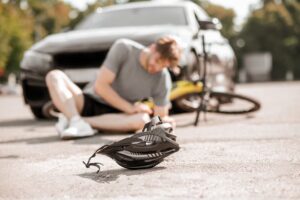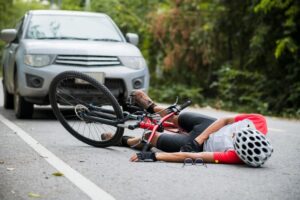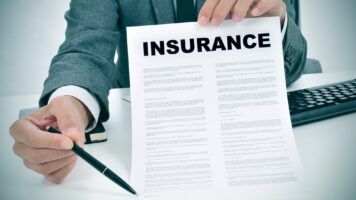Yes, if you have been injured in a bicycle accident caused by someone else’s carelessness in Missouri, you can absolutely claim compensation. A bicycle crash in Southeast Missouri can be terrifying, but your right to a safe recovery is clear. Moving forward involves understanding your rights as a cyclist, identifying the types of compensation available, and knowing the steps to take to hold the responsible party accountable.
Key Takeaways about Claiming Compensation for a Bicycle Accident
- Under Missouri law, bicyclists generally have the same rights and responsibilities as operators of motor vehicles.
- A person injured in a bicycle accident may be able to seek compensation for economic losses like medical bills and lost wages, as well as non-economic damages like pain and suffering.
- Proving that another party’s negligence (carelessness) caused the accident is essential for a successful compensation claim.
- Missouri’s comparative fault rule means an injured cyclist might still recover compensation even if they are found to be partially at fault for the accident.
- Insurance companies for the at-fault party may try to settle a claim quickly for a low amount; understanding this helps protect an injured person’s rights.
Understanding Your Rights as a Cyclist in Southeast Missouri

The law views cyclists as vehicle operators with a right to be there. According to the Missouri statutes, every person riding a bicycle upon a street or highway has all the rights and is subject to all the duties applicable to the driver of a motor vehicle. This is a crucial point because it establishes that drivers of cars and trucks have a legal duty to share the road safely and watch out for you.
When a driver fails in this duty—perhaps by texting, speeding, or making an unsafe turn—and causes a crash, they have acted negligently. Negligence is a legal term for when someone fails to use reasonable care to avoid harming others. Proving this negligence is the foundation of your claim for bicycle accident compensation.
To protect yourself and operate within the law, it’s also helpful to know your responsibilities as a cyclist. These rules are in place for everyone’s safety.
- Riding with Traffic: Cyclists must ride in the same direction as other traffic.
- Using Hand Signals: Just like a car’s turn signals, cyclists should use appropriate hand signals to indicate they are turning or stopping.
- Night Riding Equipment: For rides between a half-hour after sunset and a half-hour before sunrise, a bike must have a white front light visible from 500 feet and a red rear reflector or light.
- One Rider Per Seat: A bicycle should not be used to carry more people than it was designed and equipped for.
Following these rules helps keep you safe and can also strengthen your position if you need to make a claim for compensation after an accident.
What Kinds of Compensation Can You Claim for a Bicycle Accident?
When you’re hurt in a bicycle accident, the costs go far beyond a damaged bike or a few scrapes. The financial, physical, and emotional impact can be overwhelming. In a personal injury claim, the compensation you seek is meant to cover these losses, which are legally referred to as “damages.” These damages are typically broken down into two main categories: economic and non-economic.
Calculating Economic Damages After a SEMO Bike Crash
Economic damages are the tangible, calculable financial losses that result directly from the accident. These are the costs that come with receipts, bills, and pay stubs. The goal is to restore you to the financial position you were in before the crash occurred.
Think of it as adding up all the direct bills and lost income stemming from the injury.
- Medical Expenses: This is often the largest component of a claim. It includes everything from the initial ambulance ride and emergency room visit to hospital stays, surgeries, physical therapy, medications, and any future medical care you may need.
- Lost Wages or Income: If your injuries prevent you from working, you can claim the income you’ve lost. This also includes any potential future earnings if your ability to work is permanently affected.
- Property Damage: This covers the cost to repair or replace your bicycle, helmet, phone, clothing, or any other personal property that was damaged in the collision.
- Rehabilitation Costs: This category can include expenses for things like occupational therapy, mobility aids (crutches, wheelchairs), or modifications to your home or vehicle to accommodate a long-term disability.
Keeping meticulous records of every expense is crucial for building a strong case for the full economic compensation you deserve.
Understanding Non-Economic Damages in Your Claim
Non-economic damages are different. They compensate you for the real but intangible ways the accident has affected your life and well-being. There are no receipts for pain or sleepless nights, but these losses are just as real and devastating. Missouri law recognizes this and allows you to seek compensation for this suffering.
For example, imagine you’re an avid cyclist who loved riding through Trail of Tears State Park on weekends. If an injury from a bike accident robs you of that ability and passion, that is a significant loss.
- Pain and Suffering: This refers to the physical pain, discomfort, and general suffering you have endured because of your injuries. It can cover both the immediate pain from the crash and any chronic pain you may live with long-term.
- Emotional Distress and Mental Anguish: An accident is a traumatic event. This can lead to anxiety, depression, fear (especially of traffic or riding a bike again), and post-traumatic stress disorder (PTSD).
- Loss of Enjoyment of Life: This compensates you for the inability to participate in hobbies, activities, and life experiences that brought you joy before the accident.
- Loss of Consortium: In some cases, a spouse may have a claim for the loss of companionship, support, and intimacy resulting from their partner’s injuries.
These damages are more subjective, but they are a critical part of a claim that fully acknowledges the true human cost of a serious bicycle accident.
Proving Fault is Key to Your Bicycle Accident Claim
To successfully claim compensation for a bicycle accident, you must be able to show that another party was at fault—that their negligence caused your injuries. In Missouri, the legal system uses a principle called “pure comparative fault.”
What does this mean for you? In Missouri, if you are found to be partially responsible for the accident, your total compensation award will be reduced by your percentage of fault. For example, if you are awarded $100,000 in damages but are found to be 10% at fault (perhaps for not using a hand signal), your final compensation would be reduced by 10% to $90,000.
Because fault is so central to a claim, gathering and preserving evidence becomes incredibly important. The insurance company for the at-fault driver will be looking for any reason to shift blame onto you to reduce the amount they have to pay.
Gathering Evidence to Support Your Compensation Claim

- Organize Official Documents: Keep the police report, medical records, and any correspondence from insurance companies in a dedicated folder. The police report is especially important as it contains the officer’s initial observations and often includes witness statements.
- Document Your Injuries and Recovery: Take photos of your injuries as they heal. It’s also helpful to keep a simple daily journal. Note your pain levels, any physical limitations, doctor’s appointments, and how the injuries are affecting your daily life. This creates a powerful record of your experience.
- Track All Your Expenses: Keep every bill, receipt, and explanation of benefits related to the accident. This includes medical bills, pharmacy receipts, and estimates for repairing your bicycle. This documentation is the proof needed for your economic damages.
- Preserve Evidence from the Crash: Do not repair your bicycle or throw away your damaged helmet or clothing. These items are physical evidence of the impact and can be very useful in demonstrating the severity of the crash.
This evidence helps tell the story of what happened and clearly illustrates the full impact the accident has had on your life.
Handling Conversations with Insurance Companies
Shortly after the accident, you will likely be contacted by an insurance adjuster from the at-fault driver’s insurance company. It is critical to remember who they work for. Their job is to protect their company’s financial interests, which means paying out as little as possible on your claim.
They may sound friendly and concerned, but you should proceed with caution. Adjusters often try to get you to make a recorded statement, hoping you’ll say something that could be used to assign fault to you or downplay your injuries. They might also offer a quick, lowball settlement before you even know the full extent of your medical needs. Accepting this offer will prevent you from seeking any further compensation, even if your injuries turn out to be more serious than you first thought.
Here are a few things to keep in mind when an adjuster calls:
- You are not required to give a recorded statement. You can politely decline. It is often wise to seek legal guidance before providing any formal statement.
- Do not speculate or guess. Stick to the facts you know. Avoid saying things like “I’m fine” or “I think I’m okay,” as these statements can be used against you later.
- Do not sign anything. Never sign any documents, waivers, or releases without fully understanding what you are agreeing to.
- You can limit the conversation. You only need to provide basic information, such as your name, contact details, and the date and location of the accident. You can state that you are still receiving medical treatment and are not ready to discuss the details of your injuries or a settlement.
Remember, you have the right to take your time and ensure your health and well-being are prioritized before settling any claim.
FAQs: Can You Claim Compensation for a Bicycle Accident?
Here are answers to some common questions that arise after a bicycle accident in Southeast Missouri.
What if the driver who hit me was uninsured or underinsured?
If the at-fault driver has no insurance or not enough to cover your damages, you may be able to make a claim through your own auto insurance policy. Many policies include Uninsured/Underinsured Motorist (UM/UIM) coverage, which can apply even when you are on a bicycle. It’s important to review your own insurance policy to see what coverage is available.
How long do I have to file a bicycle accident claim in Missouri?
In Missouri, the statute of limitations—the legal deadline for filing a lawsuit—for most personal injury cases is five years from the date of the accident. While that may seem like a long time, it is crucial to act much sooner. Evidence can disappear, witnesses’ memories can fade, and delaying can make it much harder to build a strong case.
What if I wasn’t wearing a helmet? Can I still get compensation?
Missouri does not have a statewide law requiring adult cyclists to wear helmets. Therefore, not wearing one does not automatically prevent you from receiving compensation. However, the at-fault party’s insurance company may argue that your failure to wear a helmet contributed to the severity of your head injuries. This goes back to the principle of comparative fault, where they may try to reduce your compensation by a certain percentage.
Does it matter if my bicycle accident happened in a crosswalk?
Yes, the location can be very important. Bicyclists in a crosswalk generally have the right-of-way, and drivers are required to yield to them. If you were hit while lawfully in a crosswalk, it can provide strong evidence of the driver’s negligence.
What if a road hazard, like a large pothole or debris, caused my accident?
In some situations, a government entity (like a city or county) can be held responsible for an accident caused by poorly maintained roads. These cases can be complex, as they often involve specific rules and shorter deadlines for filing a claim against a government body. Documenting the hazard with photos and reporting it immediately is very important.
A Local Team to Help You on the Road to Recovery

Bicycle Accident Attorney, Phillip J. Barkett
A bicycle accident can leave you injured and unsure of what to do next. You’re likely facing physical recovery, mounting medical bills, and calls from insurance adjusters. You do not have to go through this alone. Having a dedicated legal team on your side can lift that burden and ensure your rights are protected.
At Cook, Barkett, Ponder & Wolz, we understand the challenges you’re facing because we are part of the Southeast Missouri community. Our attorneys have over 100 years of combined trial experience fighting for injured clients in Cape Girardeau, Sikeston, Poplar Bluff, and throughout the SEMO region. We believe your story matters, and we take the time to understand how your injury has impacted you and your family. We handle the complex legal and insurance processes so you can focus on what’s most important: your healing.
If you or a loved one has been injured in a bicycle accident, contact us at (573) 335-6651 or through our online form for a free, no-obligation case evaluation. We work on a contingency fee basis, which means you pay absolutely nothing unless we win your case. Let us stand by your side and fight for the justice and compensation you deserve.



